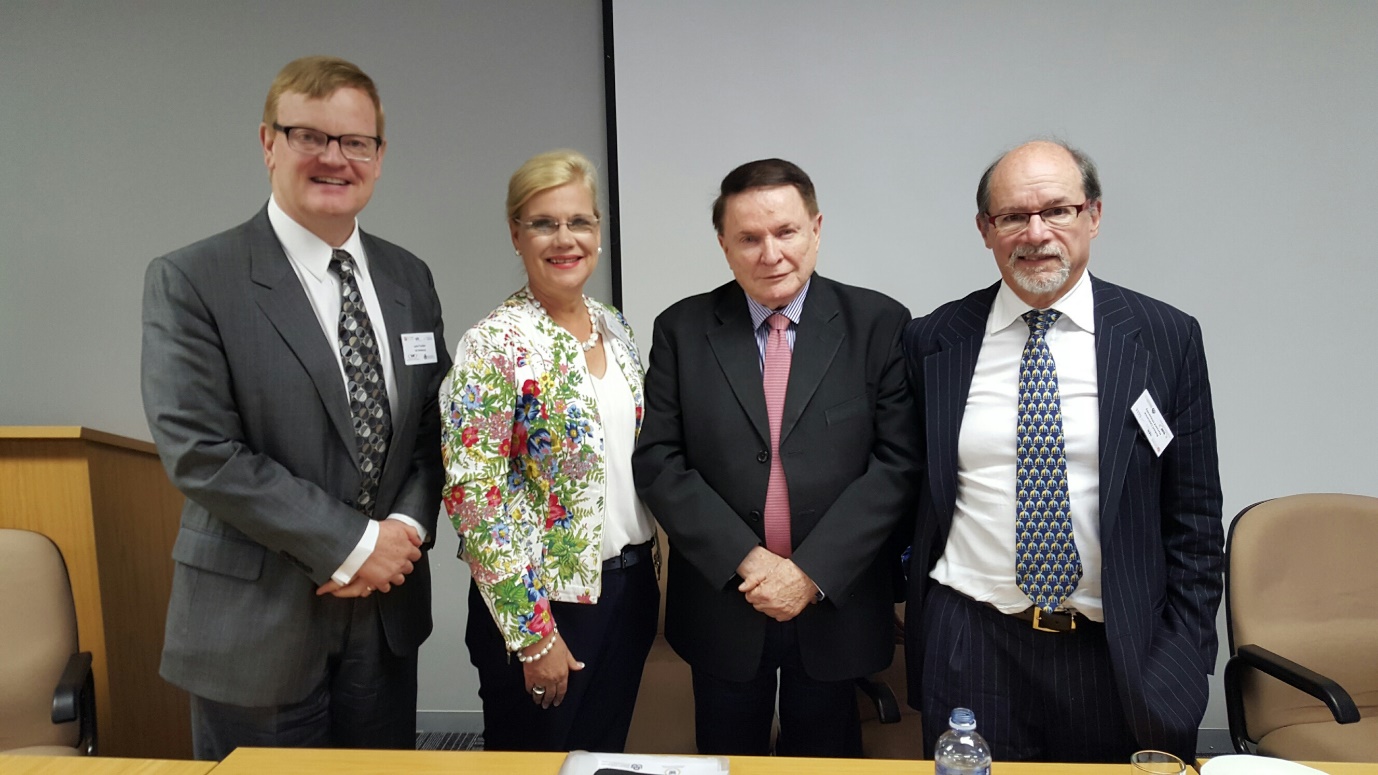 NEWSLETTER ISSUE #4/2017
NEWSLETTER ISSUE #4/2017
|
Fresh insights on trade policy and economic development
A core component of TRADE’s research activities and associated outreach programme is exploring the links between trade and economic development, and also contributing to various policy debates on how trade can be used as a more effective lever to bring about inclusive economic well-being. On 28 February 2017, TRADE co-hosted – with BUSA (Business Unity South Africa), Tutwa Consulting, Agbiz (Agricultural Business Chamber of South Africa) and the JCCI (Johannesburg Chamber of Commerce and Industry) – a thought-provoking seminar in Johannesburg on ‘US trade policy in the Trump era: What is in store for South Africa and the world?’ Chaired by Prof Raymond Parsons of the NWU School of Business and Governance and led by Prof Robert Lawrence, a trade policy expert at Harvard University’s Kennedy School in the USA, the seminar focused on President Trump’s controversial views about trade and how his pledge to bring jobs back to America is likely to impact US trade relations with different countries, including South Africa. In April, TRADE team members, Ms Ali Parry, an extraordinary research scientist, and Dr Adelia Jansen van Rensburg, a post-doctoral fellow, travelled to Dhaka in Bangladesh to conduct fieldwork as part of a DfID (Department for International Development)-funded project looking at the relative non-involvement of developing countries in the deliberations surrounding four plurilateral trade agreements: Trade in Services Agreement (TiSA), Government Procurement Agreement (GPA), Information Technology Agreement (ITA) and Environmental Goods Agreement (EGA). The project, which has brought together researchers from, inter alia, SAIIA (South African Institute of International Affairs), the TRADE research entity and Imani Development, has both qualitative and quantitative dimensions to it, with in-depth case studies drawn from Chile, Bangladesh, India, Malawi, Lesotho and South Africa. The research team will be formulating a suggested policy response, based on their findings, for consideration by the WTO, regional entities, individual governments and the broader development community. South Africa’s dti (Department of Trade and Industry) has commissioned TRADE to design a strategic framework and action plan for the development and promotion of South Africa’s services exports. According to TRADE director, Prof Wilma Viviers, services contribute about 70% to South Africa’s economy, yet the country’s services exports are still fairly limited. “With services playing an increasingly vital role in global value chains, the government’s new policy stance on services is timeous and welcome.” Part of the services export project involves training and capacity building of selected dti staff members. On 4 and 5 May 2017 Mr Martin Cameron, managing director of TRADE Advisory, led a services trade workshop, assisted by Prof Sonja Grater and Dr Adelia Jansen van Rensburg. Topics included the role of services trade in global value chains (GVCs), obstacles to success (including the prevalence of non-tariff barriers) and how the TRADE-DSM™ can streamline export promotion by creating more certainty surrounding the prospects of particular goods and associated services in various markets. The WTO Chairs Programme, now going into its fourth year, has enabled the NWU and TRADE to forge close ties with a number of WTO policymakers and technical experts, thereby enriching TRADE’s research outputs and outreach activities. From 30 May–1 June 2017, TRADE hosted a WTO workshop on ‘Global Value Chains and Trade in Value Added (TiVA)’ for researchers and policymakers. Mr Christophe Degain and Dr Victor Kummritz (Senior Statistician and Research Economist respectively in the WTO’s Economic Research and Statistics Division in Geneva), spoke about the limitations of traditional trade statistics and the growing interest throughout the world in the Trade in Value Added (TiVA) approach. The latter more precisely gauges the contribution of different products and services to a country’s economy by reducing the risk of double or multiple counting when goods and services cross borders as they progress along the value chain. Another guest speaker at the workshop, Elizabeth van Renen (Chief Director: Trade Policy and Research at South Africa's Department of Trade and Industry (dti)), stressed the need for stronger regional economic integration in Africa, supported by the value chain model. She also said that trade policy – though very important – needs to be supplemented by committed action in the areas of industrial, infrastructural and skills development. Mr Martin Cameron from TRADE Advisory rounded off the workshop proceedings by explaining the TRADE-DSM™ methodology and how it can be pivotal to cost-effective export market selection. A report back on the workshop proceedings can be found here. Ms Carli Bezuidenhout and Prof Marianne Matthee were recently greeted with the good news that their paper ‘Inclusive growth and wage inequality: The case of South African manufacturing exporters’ has been accepted for presentation at the WTO Chairs Programme event to be staged alongside the WTO Public Forum in Geneva in September 2017. Their paper is the product of a longstanding research partnership between the NWU and colleagues from Stellenbosch University, Neil Rankin and Tasha Naughtin, as well as South Africa’s National Treasury, SARS (South African Revenue Service) and UNU-WIDER. Ms Bezuidenhout and Prof Matthee will be sharing their findings on wage differentials between exporting and non-exporting firms in South Africa (an area that has attracted little formal research) and how these, together with other factors, could be a source of wage inequality – and simmering discontent in society. |
Fresh insights on trade policy and economic development
Archive newsletters |
|

